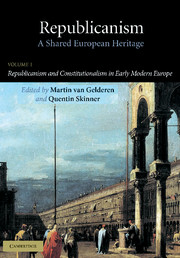Book contents
- Frontmatter
- Contents of Volume I
- Contents of Volume II
- Acknowledgments
- Introduction
- Part I The Rejection of Monarchy
- 1 ‘That a Republic is Better than a Monarchy’: Anti-monarchism in Early Modern Dutch Political Thought
- 2 Anti-monarchism in English Republicanism
- 3 Anti-monarchism in Polish Republicanism in the Seventeenth and Eighteenth Centuries
- 4 Classical Republicanism in Seventeenth-century England and the Netherlands
- Part II The Republican Citizen
- Part III The Republican Constitution
- Bibliography
- Contributors
- Index of Names of Persons
- Index of Subjects
3 - Anti-monarchism in Polish Republicanism in the Seventeenth and Eighteenth Centuries
Published online by Cambridge University Press: 15 December 2009
- Frontmatter
- Contents of Volume I
- Contents of Volume II
- Acknowledgments
- Introduction
- Part I The Rejection of Monarchy
- 1 ‘That a Republic is Better than a Monarchy’: Anti-monarchism in Early Modern Dutch Political Thought
- 2 Anti-monarchism in English Republicanism
- 3 Anti-monarchism in Polish Republicanism in the Seventeenth and Eighteenth Centuries
- 4 Classical Republicanism in Seventeenth-century England and the Netherlands
- Part II The Republican Citizen
- Part III The Republican Constitution
- Bibliography
- Contributors
- Index of Names of Persons
- Index of Subjects
Summary
Anti-monarchism is only one aspect of a wider question, that of Polish republicanism, or, more precisely, of the republicanism of the Polish nobility, because, between 1500 and 1800, it alone constituted ‘the nation’ in the political sense (not exactly a limited nation, since it accounted for between 6 and 8 per cent of the population). Republican ideology began to dominate political thought in Poland from around 1600, and by 1700 it had eclipsed all others. It could be said that between 1700 and 1800 it had become a political article of faith not only for the ideologues but also for the most of the nobility; anti-monarchism was one of its components, but not the most important, and in any case not always manifested with the same intensity. As I shall show, after a certain time in Poland anti-monarchism played a destructive role within republicanism, tending to distort it and, in the practice of politics, to foment crises in the very structures of the State.
The foundations of Polish republicanism were laid in the sixteenth and early seventeenth centuries at a time when the nobility was acquiring real power at the expense of royal prerogatives. It was then that the legislative and institutional bases of the Republic of the Two Nations (Rzeczpospolita Obojga Narodów), as it was to be called during the next two centuries, were created.
- Type
- Chapter
- Information
- RepublicanismA Shared European Heritage, pp. 43 - 60Publisher: Cambridge University PressPrint publication year: 2002
- 1
- Cited by



